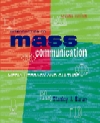Freedom of the press is established by the First Amendment of the Constitution.
This protection extends to all forms of media but can be suspended in cases
of clear and present danger and to balance competing interests, as in the conflict
between a free press and a fair trial. Libel, slander, and obscenity are not
protected. Other specific issues of media responsibility include definitions
of indecency, the impact of deregulation, and copyright.
Social responsibility theory is the idea that to remain free of government
control, the media must serve the public by acting responsibly. This does not
free audiences from their responsibility to be media literate. Applied ethics is the practice of applying general ethical guidelines and values
to a specific situation. Self-regulation by the media often results in ethical
dilemmas involving such issues as truth and honesty, privacy, confidentiality,
and conflict of interest. Media professionals have established formal standards
of ethical behavior, though some people object that they are ambiguous and unenforceable.
| 


 2002 McGraw-Hill Higher Education
2002 McGraw-Hill Higher Education